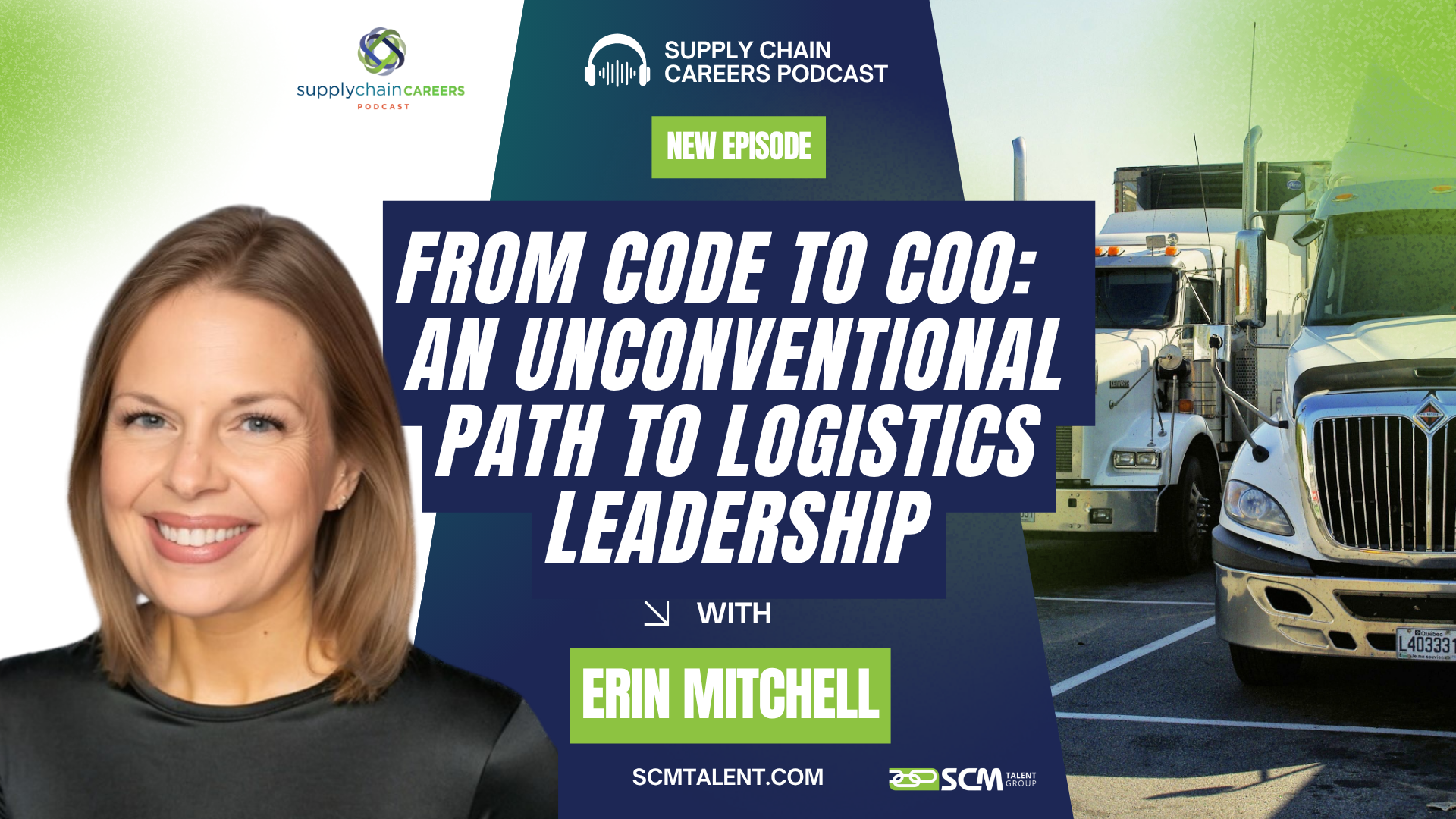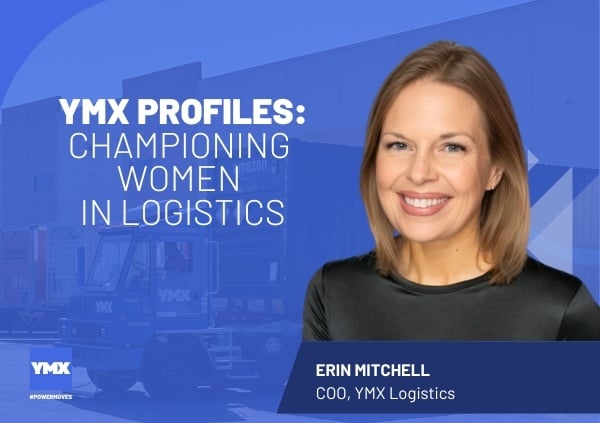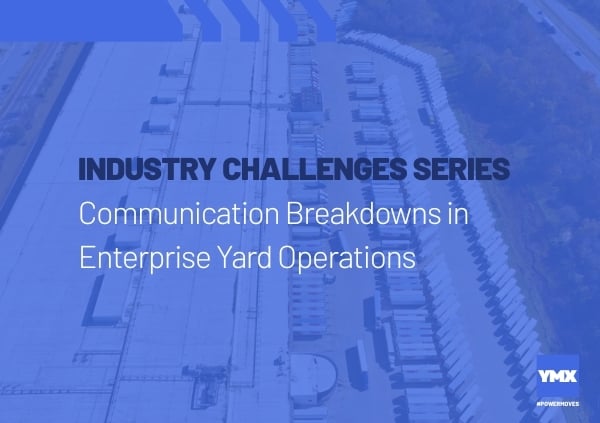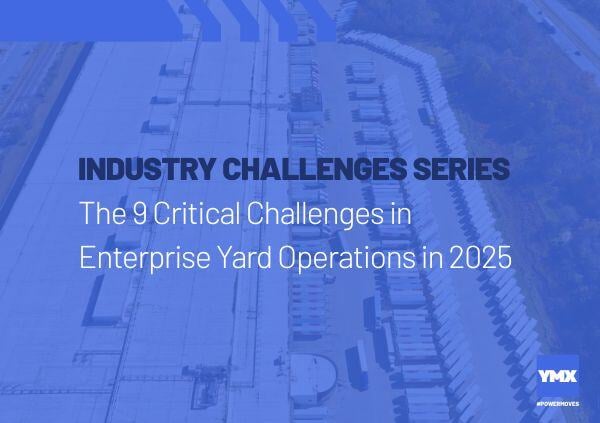What does it take to leave behind a stable and high-paying career at a giant food company to help build a logistics start-up from scratch? Ask Erin Mitchell. For her, career success isn’t about status or title. Success is derived from finding a platform where she can create a lasting impact. Erin joined the Supply Chain Careers Podcast to discuss her journey and career story. Erin’s is a case study in how combining technical fluency, servant leadership, and adaptability can drive transformation in large and small companies alike.
Erin Mitchell’s Unlikely Supply Chain Origin Story
Erin Mitchell got her start with Kraft Foods as an IT professional. She was helping to build customized logistics applications. Her work as a developer helped her to learn the ins and outs of a large industrial supply chain and the emerging and evolving roles technology professionals could play in this realm. This was her first foray into supply chain as a tech pro. When Erin started, Kraft was more focused on the make versus buy end of things. That quickly shifted as they began to outsource all of their technology roles to information-only. They also reversed their make vs. buy position and began outsourcing more.
The company’s shift allowed Erin to also shift her career perspective. Because her former role as an in-house application developer was no longer available, Erin accepted the company’s offer to sponsor her MBA and move her into roles at the intersection of people and technology. These were often operations-focused work environments.
Erin’s work and background as a software developer built her foundation of systems and defined her approach to logistics. The diversity of experience and success moving horizontally across operations, logistics, and tech helped her to mold different tactical and strategic approaches in order to build teams with just the right mixture of talent, aptitude, ambition, and problem-solving skills. The rest she could teach them. But it all started with technology.
“Most of the roles I did were in ops at the people and tech intersection. So whether it was implementing our first ERP or it was how do we wave in or weave out of certain parts of the business…”
Servant Leadership in Action: Lessons from a Career Built on Influence
Just like an influential teacher or professor, your effective mentors and leaders can leave an indelible mark on one’s career arc and trajectory. Erin was fortunate to cite a few different managers who helped her gain a foothold at Kraft Heinz and who also practiced the tenets of servant leadership. Erin’s mentors practiced this leadership style not as an ideal but as a strategic model that builds alignment and executional buy-in. It’s the age-old tactic of guiding your team to the answer on their own rather than simply saying “Hey we did it this way in the past, and it worked.” Solving the problem for them creates a dependency that you can’t have in a fast-paced operational climate where problem-solving is key.
Being mentored in this manner helped Erin develop coaching and consensus-building as her management style. Her people-first methods and mentality deploys influence instead of formal authority to modify behavior and problem-solving. Emotional intelligence and coaching culture accelerate performance in high-pressure situations, which are rampant in the volatile world of supply chain CPG.
This leadership style was especially effective for Erin in order to gain early buy-in for managing change in a post-merger environment. Implementing the practices of servant leadership helped Erin and her organization gain a competitive advantage in change management by streamlining processes and ensuring that everyone was fully bought in before the change even started.
“You can weave people through all the different objectives and opportunities and outcomes…and the group can gain consensus and align on something. You then have a go-forward plan that people aren’t gonna fight you on every step of the way.”
Strategic Lessons from the Kraft-Heinz Merger: When the Playbook Fails
There’s a pretty common saying across the end-to-end supply chain: “Supply chain is people.” No matter the number of ships, trucks, freight cars, control towers, digital twins, applications, ERP systems, etc., it’s always the people that make the difference. And in a very high-pressure situation, Erin Mitchell and her team proved this during a massive merger between global food behemoths.
There was a fly in the ointment, so to speak, with a plan that Erin and her team were charged with implementing. She has just finished hiring and onboarding a lot of new people to help with the merger, and has been very selective in who she hires.
They needed to have the following traits, and she wasn’t budging from these requirements:
- Drive for results
- Problem-solving skills
- Win-Win attitude
She was of the mind that these skills aren’t necessarily “teachable,” but with them, she knew she could build teams that possessed the intangible qualities to pivot as needed and come up with a multitude of ways to reach the outlined objective.
Sure enough, her team was given a process in which to achieve very specific outcomes, and they quickly realized it was poorly designed. They did the work, tested, retested, and determined for sure that the process was flawed. So what now? Sleepless nights and concerns not only about not reaching the goals but also about how to properly tell someone in a more senior position, “Hey, this process you gave us isn’t a feasible route to the objective.”
But they pivoted and were able to design a new and more effective process. Doing so helped Erin to understand the importance of testing strategy with operations. Just because it’s drawn up a certain way doesn’t mean it’s going to work. Having the buy-in up front from everyone, including those who will be executing, is paramount to the success or failure of a given operation.
“I have all these new people I just hired, and we don’t have a great plan. And so the two things that I needed to figure out is. How do I communicate that we need to change course? So how do I tell people that are already bought in and invested in this, that we gotta do something different? And then the second one was, my expectations don’t change.”
The Human Side of Supply Chain: Vendor and Partner Collaboration
Erin quickly learned the value of relationships while helping to manage the logistics footprint of a major brand like Kraft-Heinz. Metrics, processes, and systems often dominate logistics discussions; none of those elements function well without trust and collaboration between people.
This became clear during her time leading large-scale operations and transformation efforts at Kraft-Heinz. Supply chain disruptions, merger integrations, and just normal everyday work life show how the best-laid plans can fall apart. Proper communication, soft skills, ability to shift on a dime, and the insistence upon identifying risks and problems before they spread too far have helped Erin to succeed long-term.
“You have to have vendors that you can trust…You’ve gotta build those quick relationships, especially when the organization is in turmoil and you’re trying to execute projects…We could do a lot of things, but we could not do them without really good relationships.”
Using the Toolkit to Move from Corporate Multinational to Entrepreneurial Agility
Hard work and diligence pay off. We get proficient at our jobs and find a level of stasis. For some, that plateau is a desired spot. For folks like Erin Mitchell, it was not. She knew she was good at the corporate cost-cutting game and could transition into any number of multinational firms with great success. But, she wanted to develop a top-line initiative rather than have a sole focus on cost-cutting for bottom-line satisfaction.
After some introspection, she realized that such a transition would bore her after 6 months. For someone as proactive as Erin, this was not an option. So she conducted upwards of 40 interviews with peers, colleagues, and other members of her network to help inform a path forward for herself and her career. What is it she really wanted to do? Erin wanted to learn. That was the bottom line. She wanted to build things and solve really big problems. Building an organization from scratch fulfills all of these evolutionary career goals.
Erin’s success at YMX Logistics is not credited solely to her experience working within a multinational logistics operation. Her pattern recognition and ability to operate smoothly in a chaotic environment were a huge help. Her soft skills, which she emphasized in building teams that could manage mergers, relocations, and even talent churn, gave her confidence. She knew that she had the necessary relationship-building skills that complemented her data analytics skills to lead a company through difficult and unclear times.
High-scale experience, when combined with leadership humility - accepting that you don’t have the answer but your staff might - can translate successfully to starting a business from the ground up.
“I wanted to build something amazing. The comfort of the big brand was great, but not for me right now. So, yeah, so that was my journey. And then somehow that ended up being employee number two at a logistics startup. Yeah. But it felt right. So that’s how it went.”
Advice for the Next Generation of Supply Chain Leaders
Erin’s advice for early-career supply chain pros is in line with a lot of other supply chain thought leaders with major brand multinational experience: analytics alone won’t advance your career. If you want to stand out, get front-line operational chops. Get on the floor. Run a shift. Lead a team. It’s one thing to analyze the data, but until you’ve been in the operation, made decisions,, and felt how those decisions affect people and performance, you’re missing half the picture.
This thinking is in line with Erin’s emphasis on the value of soft skills. Young professionals need hands-on experience to be able to lead a team through turmoil and discomfort. Data and numbers do not prepare you for what happens when something fails in operations. You can’t look at a chart or ask AI to fix it. AI can’t delegate quickly and proficiently to ensure that you and your team weather the storm. This is where the most meaningful growth happens. Turmoil and challenging yourself with roles you may see beyond your reach will help young professionals to separate themselves and add value to their resumes. Erin is a living example of this ethos, and this thinking helped her rise through the ranks of a massive international brand as well as equipped her to control her destiny at a successful logistics startup.
Mentorship, Soft Skills, and Operations Experience Lead to Success
Erin Mitchell’s career success can be credited to her professional humility to learn from those above and below her. Mentorship is essential to facilitating growth. But hiring people with the right soft skills of communication, problem-solving acumen, negotiation, and emotional agility allowed her to build a toolkit that’s transferable to most any organization. Enterprise-level expertise combined with adaptability and the right people can successfully scale any business.
Tech-savvy and people-first first combined with data-informed and action-oriented, is how she grew her successful career and how she would advise other leaders to build teams. In these days of rapidly accelerating supply chain complexities, more and more people have access to cutting-edge technology and artificial intelligence. These tools are no longer reserved for the million-dollar tech budgets, but have been democratized so that even start-ups can access them. So what’s the key differentiator? And according to Erin Mitchell, it’s the people that you have deploying these tools and their soft skills that complement their data-driven decisions. Again, supply chain is people, and Erin Mitchell shows us all how to integrate this mantra into a successful career at most any size organization.
This content was created in collaboration with SCM Talent Group - a leading supply chain recruiting and executive search firm. Their team of specialized logistics recruiters is dedicated to helping organizations secure top talent that drives logistics success.





